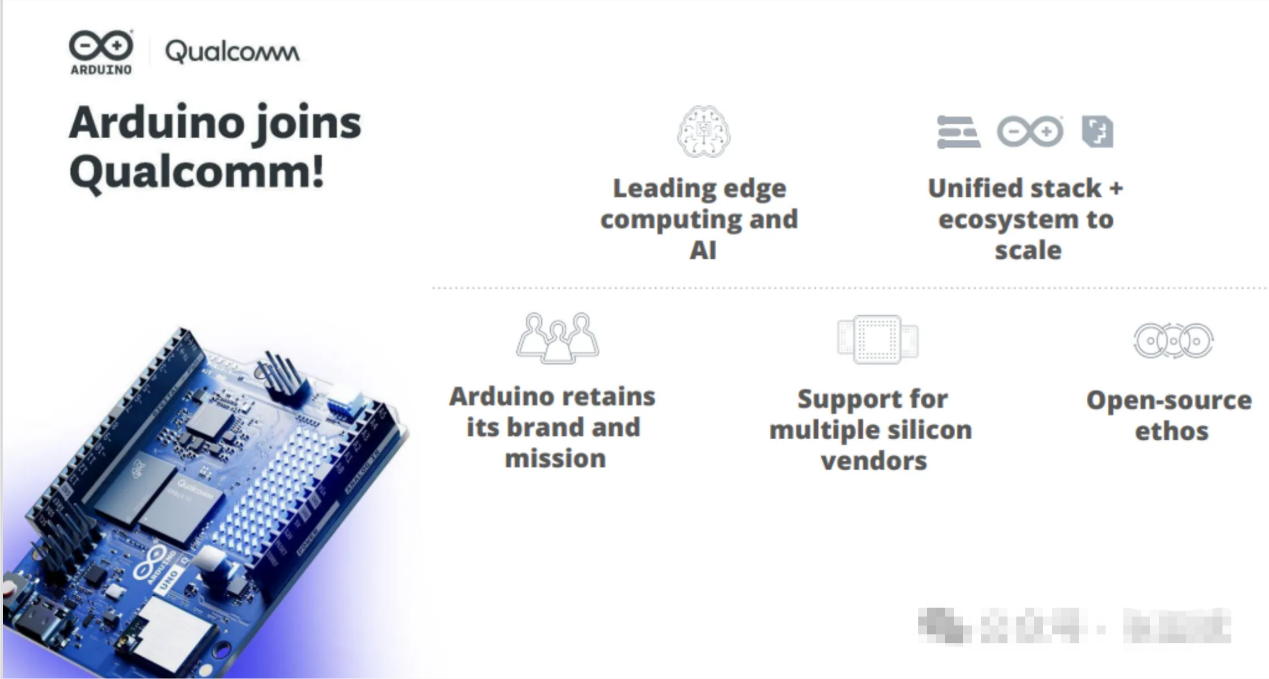Qualcomm announced it has agreed to acquire Arduino, a leading open-source hardware and software com
On October 7, Qualcomm announced on its website that it has agreed to acquire Arduino, a leading open-source hardware and software company. This acquisition combines Qualcomm's leading products and technologies with Arduino's vast ecosystem and community, empowering businesses, students, entrepreneurs, tech professionals, educators, and enthusiasts to quickly and easily bring their ideas to life.The announcement stated that this transaction accelerates Qualcomm Technologies' strategy to empower developers by providing access to its unparalleled portfolio of cutting-edge technologies and products. The acquisition builds on the company's recent integration of Edge Impulse and Foundries.io, further solidifying the company's commitment to providing a full-stack edge platform encompassing hardware, software, and cloud services. The completion of the transaction is subject to regulatory approval and other customary closing conditions.
Qualcomm stated that by combining Qualcomm's leading processing, graphics, computer vision, and AI technologies with Arduino's simplicity, affordability, and community, the company has the potential to significantly enhance developer productivity across a wide range of industries. Arduino will uphold its open philosophy and community spirit, building a full-stack platform for modern development, with the Arduino UNO Q as the first step.

\
Arduino will retain its independent brand, tools, and mission while continuing to support a wide range of microcontrollers and microprocessors from multiple semiconductor vendors, embarking on a new chapter within the Qualcomm family. With this acquisition, the Arduino community of over 33 million active users will have access to Qualcomm Technologies' robust technology stack and global reach. Entrepreneurs, businesses, tech professionals, students, educators, and hobbyists will be able to quickly prototype and test new solutions, with a clear path to commercialization supported by Qualcomm Technologies' advanced technology and extensive partner ecosystem.

The new Arduino UNO Q is a next-generation single-board computer (SBC) featuring a "dual-brain" architecture—a microprocessor supporting Linux Debian and a real-time microcontroller—combining high-performance computing with real-time control. Powered by the Qualcomm Dragonwing™ QRB2210 processor running a full Linux environment, the UNO Q is designed to enable AI-based vision and sound solutions that respond to environmental changes, encompassing applications ranging from complex smart home solutions to industrial automation systems. UNO Q is designed to be every developer's go-to tool—easy to use, versatile, and ready for lifelong learning and innovation.
Qualcomm-image
In addition to maintaining compatibility with the Arduino IDE and the iconic UNO ecosystem, UNO Q is the first Arduino development board to support Arduino App Lab. Arduino App Lab is a new integrated development environment designed to unify Arduino development across real-time operating systems, Linux, Python, and AI processes, making development faster and easier. App Lab provides developers with an open-source platform for rapidly ideating, prototyping, and scaling AI-driven solutions to production. App Lab's seamless integration with the Edge Impulse platform also simplifies and accelerates the process of building, fine-tuning, and optimizing AI models using real-world data for functions such as object/person detection, anomaly detection, image classification, ambient sound recognition, and keyword spotting.
"Through the acquisitions of Foundries.io, Edge Impulse, and now Arduino, we are accelerating our vision to make our leading AI and compute products more accessible to the global developer community," said Nakul Duggal, general manager, Automotive, Industrial, and Embedded IoT Group, Qualcomm Technologies, Inc. “Arduino has built a vibrant global community of developers and creators. By combining its open source philosophy with Qualcomm Technologies’ leading products and technologies, we are helping millions of developers create intelligent solutions faster and more efficiently, including leveraging the scale of our ecosystem for global commercialization.”
“Collaborating with Qualcomm Technologies allows us to further enhance our commitment to accessibility and innovation,” said Fabio Violante, CEO of Arduino. "The launch of UNO Q is just the beginning—we're excited to provide our global community with powerful tools that make AI development intuitive, scalable, and accessible to everyone."
"Our passion for simplicity, affordability, and community has fueled a movement that's transforming technology," said Massimo Banzi, co-founder of Arduino. Qualcomm announced it will acquire Arduino, the Italian open-source electronics platform known for its diverse development boards for makers, DIY enthusiasts, and educators. The acquisition amount was undisclosed. In an announcement released Tuesday, Qualcomm stated that Arduino's "brand, tools, and mission" will remain independent, while the company will continue to build microcontroller and microprocessor products using chips from multiple manufacturers.
In addition to the acquisition news, Arduino also announced the Uno Q development board, a Raspberry Pi-like product that combines Qualcomm's Dragonwing QRB2210 processor with a real-time microcontroller. The board runs Linux Debian and can be connected to a keyboard, mouse, and monitor via a USB-C adapter. The new product also supports lightweight AI models, enabling "AI-based vision and sound solutions that respond to environmental changes in real time."
Uno The Q comes pre-installed with Arduino's new App Lab environment, which the company describes as an "all-in-one development environment" where users can manage Arduino code, Python scripts, and AI models. The Uno Q costs $44 and is available for pre-order starting today.
"The launch of the Uno Q is just the beginning—we're excited to provide the global community with powerful tools that make AI development intuitive, scalable, and accessible to everyone," said Arduino CEO Fabio Violante in a press release.
Qualcomm added that the acquisition will provide the Arduino community's more than 33 million users with access to Qualcomm technology. "By combining their open source philosophy with Qualcomm Technologies' leading portfolio of products and technologies, we are helping millions of developers create intelligent solutions faster and more efficiently—including a path to global commercialization leveraging the scale of our ecosystem," said Nakul Dugal, general manager of Qualcomm's Automotive, Industrial, and Embedded IoT division, in a press release.
This acquisition marks a significant expansion for Qualcomm into open source hardware and the maker community, and is expected to bring even stronger technical support and commercialization opportunities to Arduino's vast user base.
---End---

